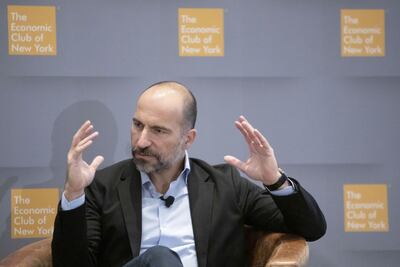Uber shares rallied after the company posted a profit in the fourth-quarter of last year compared with a loss in 2020.
The company reported a net income of $892 million in the fourth quarter of 2021, compared with $968m loss in the same period a year earlier, as the company bounced back from headwinds caused by the surge of Covid-19 cases due to the Omicron variant.
The results marked the company’s second profitable quarter since it first reported positive adjusted earnings in the third quarter of last year.
The ride-hailing company’s revenue surged $5.8 billion in the three months to December 31, a jump of about 83 per cent on an annualised basis, surpassing analysts' estimates of $5.3bn. It was up by more than 20 per cent on a quarterly basis.
The company's shares climbed 5 per cent on Wednesday after beating analysts’ expectations. They were up 6 per cent in after-hours trading.
Uber CEO
While the Omicron variant started to affect Uber’s business in late December, the company’s mobility division “is already starting to bounce back, with gross bookings up 25 per cent month-on-month in the most recent week”, Uber’s chief executive Dara Khosrowshahi said.
“Our results demonstrate just how far we have come since the beginning of the pandemic … in Q4, more consumers were active on our platform than ever before … delivery reached adjusted Ebitda [earnings before interest, taxes, depreciation and amortisation] profitability, and mobility gross bookings approached pre-pandemic levels,” Mr Khosrowshahi said.

The company’s net loss for the 2021 financial year narrowed down to $496m, down by almost 93 per cent from the $6.7bn loss the company suffered in 2020. Its last year sales increased 57 per cent yearly to $17.5bn.
The third quarter of last year was Uber’s first profitable one on an adjusted basis since its launch in March 2009. The company reported adjusted earnings of $8m before interest, tax and other expenses in the three months to the end of September.

In the last quarter, it reported adjusted earnings of $86m, ahead of analysts’ expectations of $62m.
Uber’s earnings came a day before the company’s first-ever investor day, during which the company is expected to provide details on strategy and outlook.
The company’s delivery business contributed about 42 per cent to Uber’s overall revenue in the last quarter, with delivery sales surging 78 per cent annually to $2.4bn.
Its mobility and freight businesses added $2.3 and $1bn to the last quarter’s revenue.
The company’s gross bookings surged 51 per cent year-on-year to more than $25.8bn in the fourth quarter — $2.8bn, or almost 12 per cent, up on a quarterly basis.
Delivery gross bookings increased 34 per cent during the period to $13.4bn and mobility bookings surged 67 per cent to $11.3bn.
The company said unrestricted cash and cash equivalents were at $4.3bn as of December 31, a quarterly drop of almost 33.8 per cent.
Revenue in the US and Canada jumped almost 99 per cent yearly to more than $3.6bn in the last quarter. It grew 39 per cent in Latin America to $419m and 50 per cent in Europe, the Middle East and Africa to $995m.
It also increased about 95 per cent to $751m in the Asia-Pacific region.

Trips during the October-December period grew 23 per cent year-on-year to 1.77 billion, or about 19 million trips per day on average.
The number of monthly active platform consumers reached 118 million, jumping 8.3 per cent quarterly and 27 per cent annually.
The company said it expects gross bookings of $25bn to $26bn with an adjusted Ebitda of $100m to $130m in the current quarter ending on March 31.
“We outperformed our quarterly guidance … moving forward, we are poised to continue to grow at scale while expanding profitability,” Uber’s chief financial officer Nelson Chai said.
The company said drivers and couriers earned nearly $9.5bn during the quarter, with earnings up 56 per cent on a yearly basis.

Airport gross bookings represented about 13 per cent of mobility gross bookings in the fourth quarter. It surged 24 per cent quarterly and nearly 200 per cent year-on-year, outpacing the overall mobility segment’s recovery as consumer travel trends improved.
To strengthen its portfolio, Uber acquired Car Next Door — an Australian peer-to-peer car sharing platform — for an undisclosed amount last month.
“By adding Car Next Door to Uber’s current product portfolio, we will bolster our ability to provide consumers with an easy, affordable and convenient alternative to private car ownership,” the company said.


